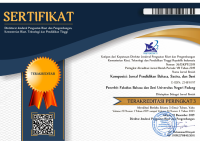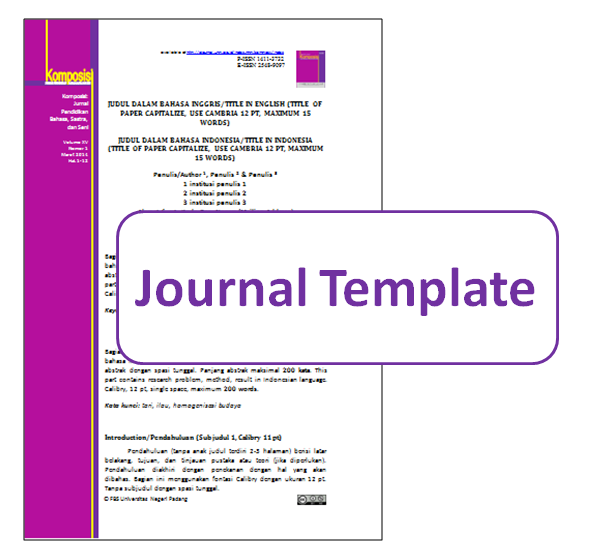Students vs Lecturers: How Should Writing be Taught and Learned?
Abstract
There have been a number of studies investigating the hindrances that students face and their preferences in writing activities. Yet, there raises questions whether all the students’ preferences should be implemented and whether lecturers should comply with all the preferences in order to create an ideal model of teaching and learning writing. Using R & D method, this present study aimed to develop Reading-Based Model of Teaching Academic Writing. This article reports the result of the first stage of the study- the needs analysis. The data were collected through questionnaires distributed to 127 university students and in-depth interview with four writing lecturers. The students’ voice of their preferences in writing activities with the lecturers’ views on an ideal writing class based on their experiences and knowledge of teaching writing were examined and compared. The results revealed that there were agreements and discrepancy between students’ and lecturers’ perception about stages in writing process, students’ ability to develop ideas, knowledge of text genres, the implementation of writing strategies, and the practice of corrective feedback. This study was expected to shed a light on how writing should be better taught and learned.
Keywords
Full Text:
PDFReferences
Individual and Pair Writing Ability Viewed from Cognitive Learning Style. Advances in Social Science, Education and Humanities Research, 411, 177-181.
Atayeva, M., Setyo, P.N.H.P., Kassymova, G., &Kosbay, S. (2019). Impact of Reading on Students’ Writing Ability.Materials of International Practical Internet Conference “Challenges of Science”. 144 (2), 5-13.
Chen, Y.S., & Su, S.W. (2012). A Genre Based Approach to Teaching EFL Summary Writing. ELT Journal. 66 (2), 184-192.
Devitt, A.J. (2004). Writing Genres. Carbondale: Southern Illnois University Press/
Dobao, A. F., & Blum, A. (2013). Collaborative writing in pairs and small groups: Learners’ attitudes and perceptions. System, 41, 365–378.
Fatimah , N. (2018). Students’ Need for Academic Writing at the English Education Department.English Language Teaching Educational Journal.1(3), 161-75.
Grabe, W. (2003).Reading and Writing Relation.Second Language Perspectives on Research and Practice.In B. Kroll (Ed), Exploring the Dynamics of Second Language Writing. New YORK: Cambridge University Press.
Hellaluddin, Ahmad, M.A., &Anshari. (2019). Need Analysis of Academic Writing Teaching Model Based on Proces - Genre Approach: What Do They Really Need?.Universal Journal of Educational Research. 8 (10), 4728-4735.
Harutyunyan, L., &Poveda, M.F. (2018).Students’ Perception of Peer Review in an EFL Classroom.English Language Teaching, 11(4), 138- 151.
Hermansson, C., Johson, B., &Levlin M. (2019). The (Non) Effect of Joint Constrction in a Genre Based Approach to Teaching Writing. Journal of Education Research. 112 (2), 1-12.
Nation, I. (2009). Teaching ESL/EFL reading and writing. Routledge
Pham, V. P. H. (2021). The Effect of Collaborative Writing on Students’ Writing Fluency; An Efficiek Framework for Collaborative Writing.
Pham, V.P. H., & Bui T.K.L. (2021). Genre – Based Approach to Writing in EFL Context. World Journal of English Language, 11 (2), 95-106.
Pysarchyk, O. L., &Yamshynska, N. V. (2015). The importance of integrating reading and writing for EFL teaching. Advanced Education, 3, 77-83.
Lee, S., & Hsu, Y. (2009).Determining the crucial characteristics of extensive reading programs: The impact of extensive reading on EFL writing.The International Journal of Foreign Language Teaching, 5 (1), 12-20.
Lin, B (2006). Vigotskian Principles in Genre Based Approach to Teaching Writing. NUCBJLLC, 8 (3), 69-83.
Kirin, W. (2010).Effects of Extensive Reading on Students’ Writing ability in an EFL Class.The Journal of ASIA TEFL. 7 (1), 285-309.
Mastura, D,M., Arsyad, S., & Koto, I. (2020). The Effect of Genre Based Approach on Students’ Writing Ability of Recount Text. Journal of Applied Linguistics and Literature, 5(1), 88-93.
Mermelstein, A.D. (2015). Improving EFL learners’ writing through enhanced extensive reading.Reading in a Foreign Language. 27(2), 182-198.
Nam. E.H.,&Seong. M.H. (2020). Teaching Activities and Students’ Preferences in Integrated College English Reading and Writing Classes. English Teaching, 75(2), 69-91.
Rozimela, Y. (2005). Genre- Based Pedagogy for Teaching English Academic Writing in an Indonesain Tertiary Context: Case Study. Unpublished Thesis. Melbourne: The University of Melbourne.
Rozimela, Y., Anwar, D., Ovilia, R., &Addinna, A. (2020).Students’ Preferences and Their Needs of Reading in Writing Class.Advances in Social Science, Education and Humanities Research, 539, 293-298.
Sabarun, Sabarun (2019) Need analysis developing EFL, Paragraph writing materials at Kalimantan L2 Learners.English Language Teaching, 12 (1). pp. 186-193.
Sakurai, N. (2017). The Relationship between the amount of extensive reading and the writing performance.The Reading Matrix: An International Online Journal.17(2), 142- 164.
Saptenno, W.Y., &Soiusa, T.R (2021).Student Peer Feedback in EFL Writing Class of English Study Program.Journal of Applied Linguistics, Literature and Culture, 1(1), 1-16.
DOI: https://doi.org/10.24036/komposisi.v22i2.114399
Refbacks
- There are currently no refbacks.
Copyright (c) 2021 Komposisi: Jurnal Pendidikan Bahasa, Sastra, dan Seni

This work is licensed under a Creative Commons Attribution-NonCommercial 4.0 International License.
Komposisi: Jurnal Pendidikan Bahasa, Sastra, dan Seni, a peer-reviewed online journal in languages, literature, and arts education.
Printed ISSN 1411-3732, Online ISSN 2548-9097.
Currently, Komposisi: Jurnal Pendidikan Bahasa, Sastra, dan Seni is indexed by:
Published by:
Universitas Negeri Padang (UNP)
Address: Faculty of Languages and Arts (FBS) Universitas Negeri Padang.
Jl Prof. Dr. Hamka Air Tawar Barat, Padang - West Sumatera -Indonesia
Telp/Fax. +62751 7053363
Home page: http://ejournal.unp.ac.id/index.php/komposisi | e-mail:komposisi.fbsunp @ fbs.unp.ac.id | cc: havid_a @ fbs.unp.ac.id
slot resmi
situs toto
situs toto toto slot
Wanita Subang Beli mobil dari Nolimit city
Gatot kaca Buat TKW Jadi jutawan
Rahasia sukses bermain Mahjing wins
rahasia sukses bermain mahjong ways
div>











